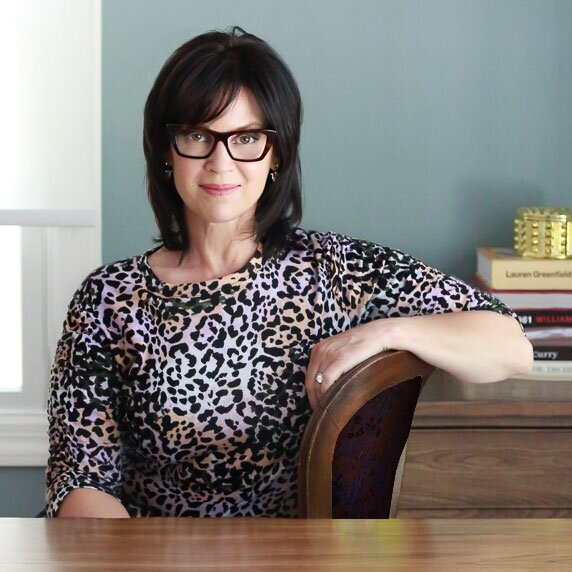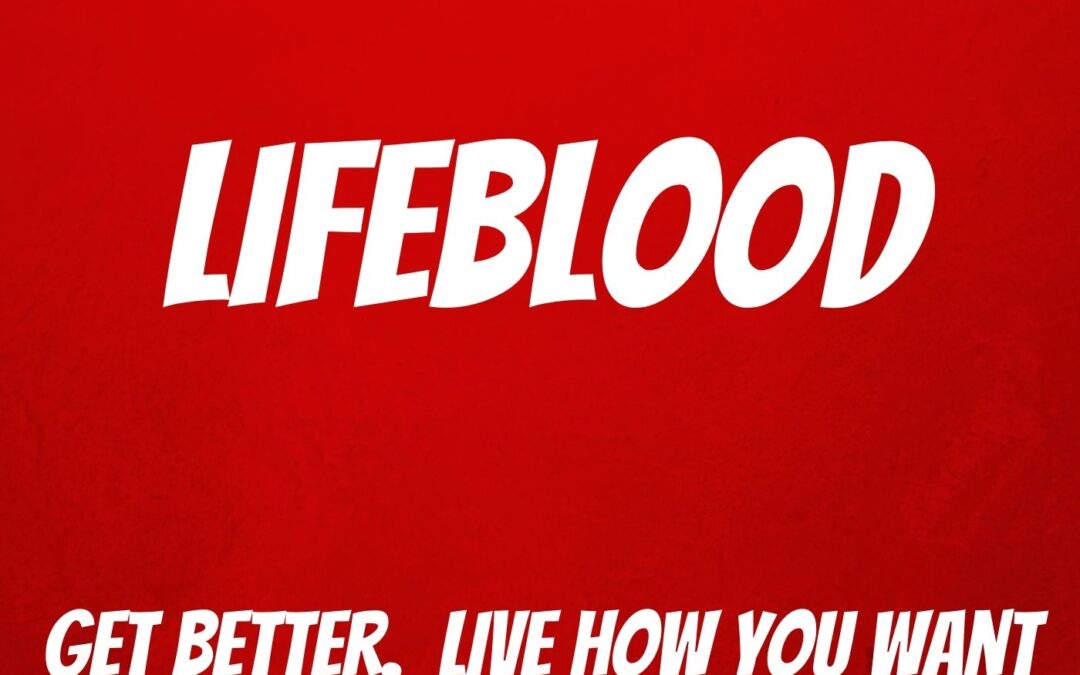Get Good with Money with Michelle Arpin Begina
How is it possible to be successful in every aspect of life; family, career, fitness and community, but be lousy with money? Michelle Arpin Begina talks about how it’s a very common occurrence, why it’s easier to overcome than you think and how to make it happen!
Listen to us On
About the Episode
LifeBlood: We talked about how to get good with money, the fallacy of “how you do one thing is how you do everything, “ the biological and psychological factors that keep us from getting good with money, and how to overcome these challenges with Michelle Arpin Begina, CFP, CIMA, Founder of MichelleAB, a Senior Partner with Snowden Lane Partners and an Official Member of the Forbes Coaching Council.
Listen to learn why the saying “it’s what’s inside that counts” is as true today as it was when your mom said it years ago!
For the Difference Making Tip, scan ahead to 20:03!
You can learn more about Michelle at MichelleAB.com, Facebook and LinkedIn.
Thanks, as always for listening! If you got some value and enjoyed the show, please leave us a review wherever you listen and subscribe as well.
You can learn more about us at MoneyAlignmentAcademy.com, Twitter, LinkedIn, Instagram, Pinterest, YouTube and Facebook or you’d like to be a guest on the show, contact George at [email protected].

George Grombacher
Lifeblood Host

Michelle Arpin Begina
Guest
Episode Transcript
Come on.
Welcome to life blood. This is George G and the time is right welcome today’s guest strong and powerful Michelle arpan vergina. Michelle, are you ready to do this?
Michelle Arpina Begina 0:20
I’m ready, ready to talk about getting better and living on purpose.
george grombacher 0:24
let’s let’s let’s go. Michelle is a CFP. She’s a CI m h the founder of Michelle AB. She is a senior partner with Snowdon, lane partners and official member of the Forbes coaching council helping people to realize their boldest ambitions. Michelle, tell us a little bit about your personal life. A little bit more about your work and why you do what you do.
Michelle Arpina Begina 0:45
Sure, a married mom of two teenage boys who are competitive across buyers feel like I live in a locker room. And I actively fight the battle of the bulge and try to make time for continuous learning while holding down to full time jobs, so yes, I’m a financial advisor. And I’ve also created a lifestyle platform to help people to take inspired action to realize their boldest financial ambitions. I come by that very honestly. I learned very early on that we have a lot of emotional hooks when it comes to money. I witnessed that growing up. So what I like to say is, I turned a morbid obsession into a profession.
george grombacher 1:37
Nice, I appreciate that. Living in a locker room with two teenage boys. So I certainly empathize as one time in my life. I was a teenage boy. And I had an older brother. So I yeah. Anyway, I’m sure it’s going great. And you’re managing through it as fast as as best as possible. So so what what was the motivator said, you mentioned that you’ve always known that that people struggle, there’s there’s a missing link? What was the motivator from being traditional doing the traditional financial advice piece to launching your lifestyle platform.
Michelle Arpina Begina 2:18
So you don’t get to expression? How you do one thing is how you do everything. I think it’s a farce. I think that we can and often do have it all going on with life. And yet, we can have this money thing that’s just not all buttoned up and locked down. You know, work is great, everyone’s healthy, close family ties to friends. And yet money can be an area that’s really messy. And when everything else is fairly organized and put together.
george grombacher 3:02
Yeah, you know, that’s funny, you do hear how you do one thing is how you do everything, but it just isn’t really true, is it because there are certainly things that we have in our lives. And in this case, one of the most important, which is money that we can suck up.
Michelle Arpina Begina 3:19
Yeah. And I think with a reference, you know, that phrase, what it references, it’s supposed to be a commentary on our character. And what I think is we act differently, we control ourselves differently with money, depending on the role that we’re playing and the context that we’re in, right, this contextual self control. And what we want out of one area of life is often different than what we want out of other areas of life. So like, for example, we may want to take the world by storm at the office, and we may want peace and harmony at home. So we may look the other way we may delegate our finances to our spouse, because we want to avoid fighting with them. Right. And we may at the office, negotiate and advocate for ourselves for what we think we’re do without any type of emotional hook. So I think we act differently depending on what role we’re playing, what our needs are and who we’re interacting with.
george grombacher 4:18
It would almost be weird. if if if we didn’t? I think it would be. Yeah. I you know, just to think of myself as just sort of a static character moving through life and doing the same thing in every possible situation. Or maybe that’s something to aspire to Michelle, but it’s just not the reality. Maybe I think it’s a fictional character. Yeah. It’s interesting, fascinating. That that idea of how you do one thing is how you do everything is a commentary on our character. So if I am somebody who is I show up I’m on time I’m trustworthy, then that’s a very good thing, but you If I do all those things yet, I’m not good at money. Because it is kind of a comment on our character that would really that’s kind of probably causes a lot of shame and embarrassment and probably avoidance.
Michelle Arpina Begina 5:13
Absolutely, yeah. Yeah. Because think about, you know, we social compare all the time. And that brings expectations that we have, or even expectations that we think other people have for us. And I think that just complicates matters.
george grombacher 5:33
And so, therefore, it’s, it is a resistance or an avoidance and all eventually get to that tomorrow, or a year from now or five years from now or whatever. And then it’s a function of I’m not interacting with, with with, with the financial apparatus, I’m not saving, enter, what, what, what you’ve created, and I assume it’s how do I do a better job of meeting people where they are, and breaking down some of those walls?
Michelle Arpina Begina 6:04
Hmm, absolutely. And I think just to go back on something you just said, George, the, you know, the embarrassment, embarrassment that we may feel may stop us with that avoidance piece. But there’s also you know, that someday, right, that expression, someday is not a day on the calendar. But there is a concept of psychological distance, which makes it very difficult for us to actually get started sometimes. And what I mean by that is, who we are today versus who we’re going to be 10 or 20, or 30 years in the future. Great. So if you put it in a financial goal context, you know, a lot of the planning that we do the saving investing, the planning that we have to do, are usually not one hit wonders, they’re usually decades in the making of consistent behaviors and actions. Well, when that future self, and that goal we want to reach is really not someone that we have a relationship with, right? We we literally think of that future version of ourselves as someone completely different, and we don’t feel very connected to him or her. And that’s what actually makes it difficult for us to be more future focus, then present focus. And then there’s some biological reasons for that, too, which is, you know, a bird in the hand, biologically is better than two in the bush, meaning, you know, we’re gonna feast or famine, because we have it today versus wanting to put it away for tomorrow. So we’ve got some biology and some psychology that holds us back, sometimes just becoming aware of those things are in play, sometimes it’s an informational thing that you can start to make sense of it. Like, for example, with psychological distance, the best thing to do is to bring that person closer, right. So the, the, the, the more imaginative you can be of what you’re wanting your life to look like in the future. And really feeling that integrating that as a relationship or that you are taking care of another person. Like, if you think about, if you’re older version of yourself, or your friend today, and you literally had that kind of a mindset, you would probably start to make different choices, because now you’ve made that person real. Yeah, we tend to err, you know, we tend to want to do the right things for the people that we care about.
george grombacher 8:31
And it’s not that we don’t care about people that we don’t know, it’s just that it’s hard to get our brains around that, you know, more about my toothache than then a horrible accident earthquake across the world that kills 4000 people.
Michelle Arpina Begina 8:45
But that’s a perfect example of why that happens. Yes, it’s, you know, it’s, it’s the them out there that we don’t know. And yeah, we can bring issues closer or circumstances that we hear about closer. Yeah, then we start to feel the personal emotional connection to it.
george grombacher 9:09
It’s an interesting thing. And I imagine this is obviously something you spend, when when you’re not managing the locker room at home. I imagine you spent a lot of time sort of trying to get your brain around this. But and how do you then because it’s not people talk about financial literacy, and we need more financial literacy. And there is truth in that, that helping somebody to just become aware of the psychological and biological problems are very real. But it seems so obvious, and I’m sure to you so how do you sort of balance that
Michelle Arpina Begina 9:51
question? Well, speaking of financial literacy, one of the things that you might want to know about me is living in the state of New Jersey. I I initiated something with the board of education about two years ago that’s actually coming in, coming to fruition this September, that in our K through 12, learning curriculum, financial learners learning standards, our children are going to start learning financial psychology and behavioral economics as part of the curriculum, I’m actually the first state to incorporate that. That said, it’s not enough. But what I what I mean, it’s not enough financial literacy is not enough. So, you know, I think money clouds our perceptions of ourselves, especially if you’re not good with money. And what I mean by good with money, is that your financial status matches your state of mind. So it’s when you think about money, you pay attention to it, you know what to do with it, without fear, or worry, and the financial choices to save where to invest, how to spend your money, all align with your values, your goals, and even your life purpose. To me that’s being good with money. And it’s not just the financial literacy part in the facts and the knowledge and the information that we need to have. There’s also a Know thyself part, which is where the psychology and the behavioral economics components come in. So when you say Know thyself, what is that? How does that apply? That’s knowing your money story, right, which creates a narrative. So that’s just that can be as simple as going back and thinking about, okay, what were the really big money moments? Or what are called flash points, positive or negative that you remember? What did you hear growing up? Right? Our parents all had wonderful expressions. While we were growing up, so just plugging into those. But as adults looking back, what it does is it gives us a chance to look at things through a fresh set of adult eyes and question, what really happened? What do we really hear? What do we make it mean? And then what do we end up internalizing, as our beliefs? Right? So I, for example, I’m one of my clients did this and realize that, or he re heard his father’s voice, which used to always say money isn’t important. And as a young 20, something, he questioned that. And he was questioning because after five years of an investment banker role, he had $1,000 to his name, and he was working, you know, crazy hours of making tons of money, it was not very happy. And when he realized that he had internalized that message, he was able to say, wait a minute, money is not everything, but it is important. And that was the beginning of a major shift in his life. It didn’t happen overnight. It took, you know, like everything in life, it takes a while for for, you know, for us to become the success that we want. But he’s certainly he doesn’t he has a lot more than $1,000 in the bank right now. And he’s in he actually changed careers and is much more satisfied in terms of his know how he is spending his work time for fulfillment and it’s it’s led to a lot of financial abundance for him and it really it started all right there.
george grombacher 13:26
Yeah, they could that’s I think that that’s incredible. And what a great way to to phrase it think about it is looking back on our childhood experiences through our our adult eyes. And that one for sure. If we never think to do that, then then then why would we do it?
Michelle Arpina Begina 13:45
Yeah, I’m we’re not taught to do it. Right. We’re just what and I think part of why is because we don’t quote unquote, talk about money. Right? So how would we even know to do that? Because we’re not even talking about it. So Brian is talking about it, the suggestions not even gonna come up, right? Yet we don’t sit around on, you know, our weekends and ask our friends like so how did you overcome your money? beliefs? You know, what were they were they formed? Like, we just don’t do that. You know, even I don’t put together PowerPoint slide presentations for my sons and teach them financial literacy.
george grombacher 14:19
Yeah, totally. Like, we’re gonna take a break from the activities here in the locker room to bring you a PowerPoint on financial literacy. That’s it tension please, sure. sure that both your boy is very, very mindful and thoughtful, but that may be a bridge too far. So we’ve been talking about a lot of really important things getting aligned with all the different aspects of our spending and as all of it are values and now looking backwards at childhood experiences, and financial literacy, and obviously I need to know how my 401k works and I need to know how this stuff works. What is the starting point? So because it can be overwhelming everything we’ve been talking about?
Michelle Arpina Begina 15:06
Yeah, I think the starting point really is a couple things. It’s what we talked about, which is going back and, you know, just rethinking how was money growing up. And I also think there’s another starting point as an adult, that we all have a success formula, right, a special X factor of that method to our madness, that we can, we can recount the against all odds type of successes that we’ve had in life where we’ve preferred prevailed, whether they’re money related or not. And we can look really carefully to trace the roots of our past successes, in order to be able to map the components that make us successful onto our money. So for example, we usually we use a combination of a lot of things. But the ones that I’ve seen in particular is a combination of positive psychology, psychological capital, and resilience strategies. And all of those can be mapped and applied to how we think and act when it comes to money. So like, for example, my passion to always be learning gives me an edge. It’s the same edge that it gives Warren Buffett, how I summon my inner Erin Brockovich, right? She’s friendly, she’s fierce. And she’s, uh, she’s got an advocate mindset, when I’m nervous to act, right, or using memorization as a tool to keep my goals front and center helped me control my behavior, and take the right actions so that I get what I want out of life. And I think we all have an opportunity to look at past successes and pull those threads out the common threads that we see. And then think about how can we use these things that have helped to make us successful? That probably just came very naturally? How do we use what we already do? Well, that has worked, and now apply it to money. And no one tells us to do that.
george grombacher 17:18
I love it. Yeah, certainly our success leaving clues throughout the course of your life, what was it that that helped you to be successful in that thing that you did back that one time? And then how can you take and apply those things, the combination of positive psychology resilience strategy, there was another thing that you mentioned that I wasn’t able to write down, but,
Michelle Arpina Begina 17:44
um, psychological capital or positive psychological capital, which is, for those that are not familiar, it’s what you know, who you know, what you have, and who you’re being. So for example, when I use Erin Brockovich, as an example, my, you know, alter ego, not really, but components through, that’s who I’m being. So I might not have that in the moment, but I can think of people who do and just emulate it. And then eventually, it becomes a part of who I am in my process of becoming successful. And where the success formula came from is I actually one day sat down and looked at, in chronological order just went through like my 20s 30s, and 40s. And just started to think about different things that were really challenging for me to accomplish. And I just kind of started writing about them. And when I sat back and looked at it from a 30,000 foot view, I started to see two things. So I started to see how I had layered on different skills from my 20s to 30s to 40s, right, like, in my 40s, I just knew how to navigate things that I didn’t in my 20s because that’s just called life experience. And then I also saw some common overlaps to things that I did naturally, that applied to all of my successes. And that’s when I really started thinking about this and teaching it to money to people, that you are life success, even if money is not where you want it to be. Or maybe it’s even a hot mess. You You can take the other parts of your life that you feel really grounded in and you can apply your method of your own madness and apply it to money to get the things that you want out of it. And to prove your relationship with them.
george grombacher 19:51
Yeah, I think that’s such a powerful thing. Huh? Well done. Michelle, people are ready for your difference making tip No, that was a really really good one. What do you have for them?
Michelle Arpina Begina 20:03
I’m gonna go back to mom. She was right. It’s what’s inside that counts and putting self knowledge ahead of or at least on par with financial literacy is my difference making tip.
george grombacher 20:17
Wow, I think that that is great stuff that definitely gets Come on Come on. For sure 1,000% people build up financial stuff way too high like you already know it’s already inside you that counts and you already know you already have experienced the success just take what you know and apply it to this world and and it’ll certainly get you where you need to go. I love it. Well, Michelle, thank you so much for coming on. Where can people learn more about you? How can people engage with you?
Michelle Arpina Begina 20:43
best place to find me is either LinkedIn or my website which is Michelle a be calm. It’s Michelle with two L’s AP comm and actually there is a success formula guide. That is my giveaway to anybody who’s interested in it. You can trace the rest of your success and all the stuff we’ve been talking about today. Awesome.
george grombacher 21:05
Well, if you enjoyed this as much as I did show me show your appreciation and share today’s show with a friend who also appreciates good ideas you can find Michelle on LinkedIn and go to Michelle A B comm that’s m IC h e l l e a b.com and pick up a copy of Michelle success formula guide. Thanks, Kim. Michelle. Thank you so good being with you. And until next time, keep fighting the good fight. We’re all in this together.
More Episodes
How to Have a Better Tomorrow
I want to help you have a better tomorrow. One of the common bonds between all humans is our impulse to find happiness. Too often, we’re looking in the wrong places, and doing the wrong things expecting them to give us the right results. If you don’t think your future...
How to Become Financially Secure
You want financial prosperity, and I want that for you as well. In fact, I want you to get whatever you want out of life. In order to do that, you need to be financially secure-something only a small percentage of Americans are. Being financially secure means...
Successfully Dealing with External Forces
On our paths to success and contentment, we constantly encounter external forces which can derail or sidetrack us. The more prepared we can be, the better our chances of successfully dealing with resistance. I grew up in the Midwest, and on summer road trips,...
Overcoming Internal Resistance
Internal resistance shows up every time we decide to make change. Our brains are awesome. They’ve kept us at the top of the food chain for over 2 million years, and that’s something I’m grateful for. They’re also great at keeping us alive through instincts like...
Understanding Your Financial Patterns of Behavior
We all have patterns of behavior and habits we follow. But why? Where do they come from? How can we change them? Humans have been studying patterns for a long time. Ancient Greeks like Plato and Pythagoras worked to understand patterns in nature. Over time,...
How to Get In the Black
When an individual or a company is in the black, it means they’re doing well financially. They don’t have too much debt, and they’re making progress towards their goals. Being in the red is essentially the opposite. It means they’re not profitable and showing a...
Should You Decentralize Your Personal Finances?
Do you want to decentralize your personal finances? Is Bitcoin a good investment? These are important questions to consider. I know I’m frustrated by centralized control in general. I’m interested in making my own decisions about how to live my life, and I’m...
Unburdened: How to Change Your Future and Your Fortune
If you were unburdened, how would your life be different? Would you be more financially successful? Would you have better relationships and more personal success? Would you be an entrepreneur, or a leader in your community? How would getting out from underneath...
How to Live a Contented Life
What does it mean to be contented, and how do we live contented lives? I believe answering that question and pursuing that life is central to existence. According to a recent study, less than 14% of Americans are very happy. And while we’ll explore the relationship...
Join the show.
Interested in being on the show? Tell me a little bit more about you and what you’d like to talk about!














